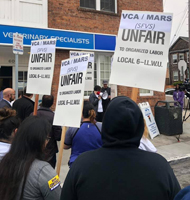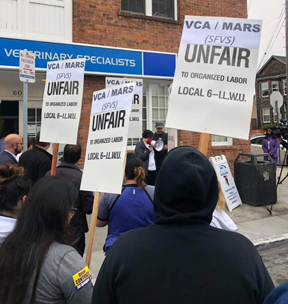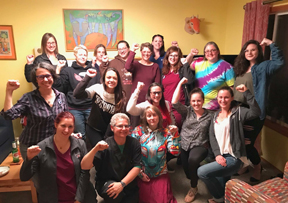
SFVS on strike 288

Facebook photo
Workers at VCA San Francisco Veterinary Specialists walked off the job on September 5. After voting to join the International Longshore and Warehouse Union, support staff at the hospital have protested unfair labor practices on the part of Mars-owned VCA several times this year. The actions are a first for employees at a private-sector animal hospital.
Efforts to introduce collective bargaining for support staff at corporate veterinary practices advanced by inches this year. Successful union votes by veterinary technicians, assistants, maintenance personnel and customer service representatives at four West Coast animal hospitals in 2018 were followed in 2019 by ownership pushback, a strike and a failed attempt to unionize at a fifth hospital.
Support staff say they want improved workplace safety, training, staffing, professional development, and better compensation and benefits. The challenges for veterinary technicians, in particular, have been reported for years.
So far, no union contracts have been adopted. Negotiations at VCA San Francisco Veterinary Specialists have become contentious. Affiliated with the International Longshore and Warehouse Union (ILWU), support staff have staged walkouts and rallies to draw attention to what they have called "deplorable" working conditions and illegal anti-union activity by VCA.
Owned by the privately held international conglomerate Mars Inc., VCA is among the largest hospital chains in North America, with more than 920 facilities in the U.S. and Canada.
A resolution passed in July by the San Francisco Board of Supervisors, the legislative branch of the city and county of San Francisco, voices support for the workers and outlines claims against the company. It reads in part: "VCA-SFVS has subjected workers to a sustained anti-union campaign, including the hiring of anti-union consultants, anti-union attorneys, captive-audience meetings, and other tactics, some of which are ongoing and designed to thwart the rights of workers."
The resolution also states that the company had been charged by the federal government with violating federal labor laws, "triggering a voluntary walkout on June 27 by an overwhelming majority of workers, making it the first such strike in the nation by employees at a private-sector animal hospital."
According to the resolution, workers report that the company continues to engage in a range of anti-union activities, "including retrogressive bargaining, union surveillance, and closing parts of the hospital in order to threaten and coerce employees, all of which are prohibited by the National Labor Relations Act."
San Francisco Supervisor Hillary Ronen, who represents the district where the hospital is located, said, "[The company is] doing this because they know when they win at this facility, that it is going to spread across the country," according to an ABC News report of a walkout in September.
There is no official deadline for negotiating a contract but generally, lengthy negotiations favor owners because workers can lose steam during a protracted process. "People quit, people leave, especially on our side because of difficult work environments and low pay," said Liz Hughston, a founding member of the National Veterinary Professionals Union (NVPU). In addition to losing members from negotiating teams through "flux," lengthy negotiations take a toll on morale. "They may feel like nothing is happening, like nothing is being done," Hughston added.
VCA also challenged the right of two workers to cast ballots in a successful union election at VCA Northwest Veterinary Specialists in Clackamas, Oregon. Support staff there voted 54 to 53 to join ILWU in July 2018. The National Labor Relations Board (NLRB) reviewed the voting and eligibility, and certified the union election with a one-vote margin in March.
Brandon Antin, VCA's vice president of corporate affairs, provided a statement to the VIN News Service expressing appreciation for the knowledge, dedication and valuable skills of the hospital teams. "As a company, we work very hard to develop a culture where our team members are appreciated and supported throughout their careers," he wrote. "While we respect the right of our team members to choose union representation, we believe we can best resolve issues that arise by maintaining an open environment in which we can communicate directly with our associates, and our associates can communicate directly with us, without having to go through a third party."
Antin pushed back on the San Francisco Board of Supervisors' depiction of VCA's actions.
"It is not uncommon for contract negotiations to take time. Nor is it uncommon for unions to file charges with the NLRB during collective bargaining negotiations, as the charges can be a way of seeking leverage in the negotiations," he wrote. "With respect to VCA SFVS, we have denied the union's claims on a number of these charges, many of which have already been withdrawn. In the cases referenced, VCA SFVS reached an agreement with the Union and NLRB to resolve these charges and an official Notice to Employees was posted."
Contract negotiations will continue into 2020. In his statement, Antin said that during the past 18 months, VCA SFVS and ILWU have participated in 21 bargaining sessions, and VCA NWVS and ILWU have participated in nine; more sessions are scheduled.
"VCA remains committed to continuing to bargain in good faith to reach an agreement that treats associates fairly while enabling us to continue providing the highest levels of specialty patient care and emergency services for patients and clients in San Francisco and Portland."
Efforts to negotiate and approve a contract are proceeding in an orderly fashion at BluePearl Pet Hospital in North Seattle, Hughston said. BluePearl support staff voted 46-4 to join NVPU in May 2018.
CRVS union vote 288

ILWU photo by Ryan Dowling
Support staff at Columbia River Veterinary Specialists in Vancouver, Washington, celebrated a 55-to-1 vote to join the International Longshore and Warehouse Union in October 2018.
Also owned by Mars, BluePearl Specialty and Emergency Pet Hospital operates more than 80 hospitals in 25 states. The company's chief medical officer, James Barr, gave VIN News a written statement about the union effort. It reads:
"We care deeply about all our Associates and know they are essential to our ability to deliver compassionate, advanced care for pets. We believe that a direct relationship with our Associates is the best way to understand their concerns and address them in real time. While we were disappointed to learn that some team members felt the need to form a labor union, negotiations with the NVPU are on-going and we are committed to bargaining in good faith."
PetVet Care Centers, a private-equity backed practice chain with more than 200 hospitals in 28 states, according to its website, has split one-for-one in union elections so far. In October 2018, Columbia River Veterinary Specialists in Vancouver, Washington, voted 55 to 1 to join ILWU.
While contract negotiations are ongoing, Kat Bennett, a licensed veterinary technician who serves on the union's action committee, said that since the vote, several staffers have left for other jobs and other professions, which makes negotiating a contract more challenging.
Bennett has been a veterinary technician for 19 years. She insists that a union is essential for making veterinary technology a viable career. Reflecting a sentiment voiced by many staffers who back unions, she said corporate greed is the obstacle. "They make tons of money on the backs of people who are doing hard work," Bennett told VIN News.
That underdog spirit did not carry the day at 2019's only union election. A vote by support staff at PetVet's Berkeley Dog & Cat Hospital in Berkeley, California, resulted in a tie, which leaves everything status quo. Workers can vote again in one year. PetVet did not return calls from VIN News.
NVPU's Hughston said support staff at other hospitals are in the quiet phase of organizing, and she expects more union elections will come in the new year.
Correction: This story has been revised to correct the statement that VCA-San Francisco Veterinary Specialists was the first veterinary hospital to unionize and the first to wage a strike. After publication, the VIN News Service learned there has been at least one: Support staff at a privately owned veterinary emergency hospital in Pennsylvania successfully formed a union in 2004. That union reportedly disbanded three years later after contentious contract negotiations, a strike and a ruling by the National Labor Relations Board that the company had violated labor law in its conduct relating to the union.